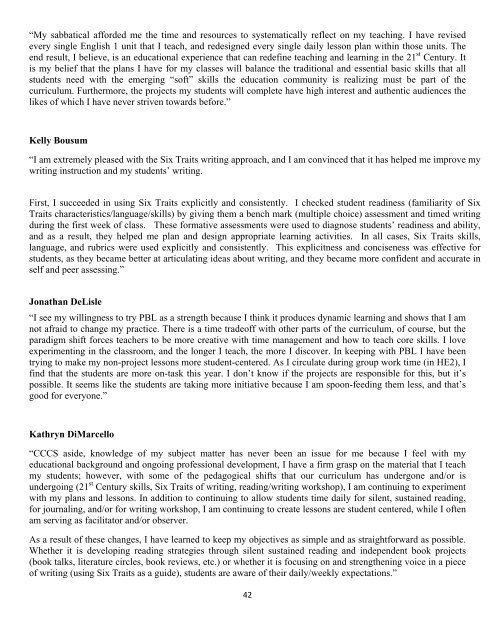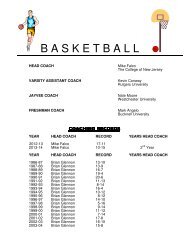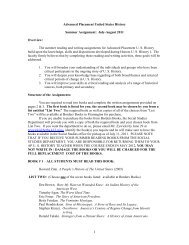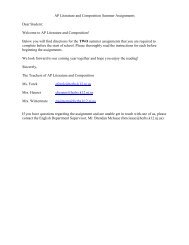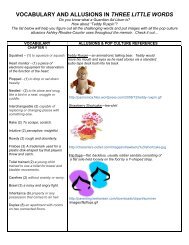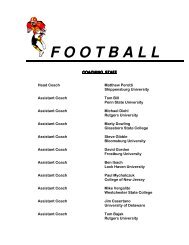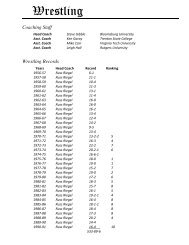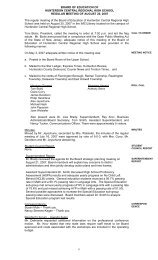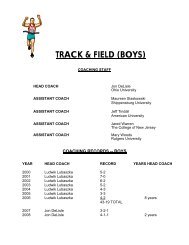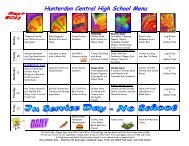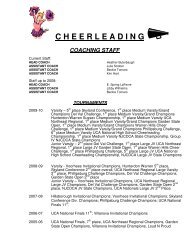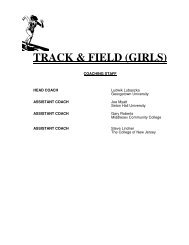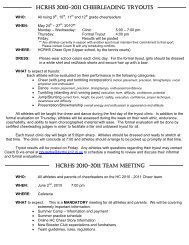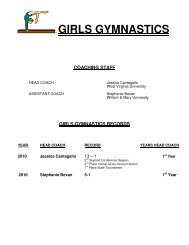HUNTERDON CENTRAL REGIONAL HIGH SCHOOL DISTRICT
HUNTERDON CENTRAL REGIONAL HIGH SCHOOL DISTRICT
HUNTERDON CENTRAL REGIONAL HIGH SCHOOL DISTRICT
You also want an ePaper? Increase the reach of your titles
YUMPU automatically turns print PDFs into web optimized ePapers that Google loves.
“My sabbatical afforded me the time and resources to systematically reflect on my teaching. I have revised<br />
every single English 1 unit that I teach, and redesigned every single daily lesson plan within those units. The<br />
end result, I believe, is an educational experience that can redefine teaching and learning in the 21 st Century. It<br />
is my belief that the plans I have for my classes will balance the traditional and essential basic skills that all<br />
students need with the emerging “soft” skills the education community is realizing must be part of the<br />
curriculum. Furthermore, the projects my students will complete have high interest and authentic audiences the<br />
likes of which I have never striven towards before.”<br />
Kelly Bousum<br />
“I am extremely pleased with the Six Traits writing approach, and I am convinced that it has helped me improve my<br />
writing instruction and my students’ writing.<br />
First, I succeeded in using Six Traits explicitly and consistently. I checked student readiness (familiarity of Six<br />
Traits characteristics/language/skills) by giving them a bench mark (multiple choice) assessment and timed writing<br />
during the first week of class. These formative assessments were used to diagnose students’ readiness and ability,<br />
and as a result, they helped me plan and design appropriate learning activities. In all cases, Six Traits skills,<br />
language, and rubrics were used explicitly and consistently. This explicitness and conciseness was effective for<br />
students, as they became better at articulating ideas about writing, and they became more confident and accurate in<br />
self and peer assessing.”<br />
Jonathan DeLisle<br />
“I see my willingness to try PBL as a strength because I think it produces dynamic learning and shows that I am<br />
not afraid to change my practice. There is a time tradeoff with other parts of the curriculum, of course, but the<br />
paradigm shift forces teachers to be more creative with time management and how to teach core skills. I love<br />
experimenting in the classroom, and the longer I teach, the more I discover. In keeping with PBL I have been<br />
trying to make my non-project lessons more student-centered. As I circulate during group work time (in HE2), I<br />
find that the students are more on-task this year. I don’t know if the projects are responsible for this, but it’s<br />
possible. It seems like the students are taking more initiative because I am spoon-feeding them less, and that’s<br />
good for everyone.”<br />
Kathryn DiMarcello<br />
“CCCS aside, knowledge of my subject matter has never been an issue for me because I feel with my<br />
educational background and ongoing professional development, I have a firm grasp on the material that I teach<br />
my students; however, with some of the pedagogical shifts that our curriculum has undergone and/or is<br />
undergoing (21 st Century skills, Six Traits of writing, reading/writing workshop), I am continuing to experiment<br />
with my plans and lessons. In addition to continuing to allow students time daily for silent, sustained reading,<br />
for journaling, and/or for writing workshop, I am continuing to create lessons are student centered, while I often<br />
am serving as facilitator and/or observer.<br />
As a result of these changes, I have learned to keep my objectives as simple and as straightforward as possible.<br />
Whether it is developing reading strategies through silent sustained reading and independent book projects<br />
(book talks, literature circles, book reviews, etc.) or whether it is focusing on and strengthening voice in a piece<br />
of writing (using Six Traits as a guide), students are aware of their daily/weekly expectations.”<br />
42


